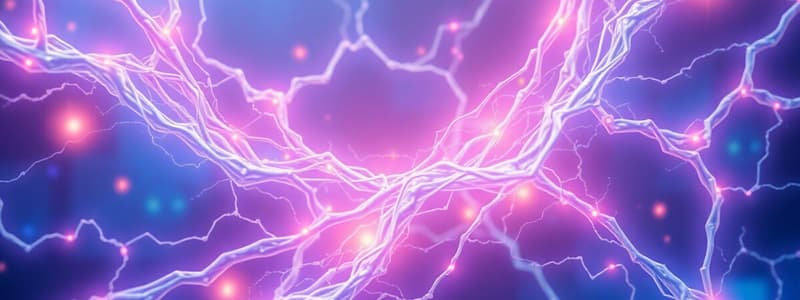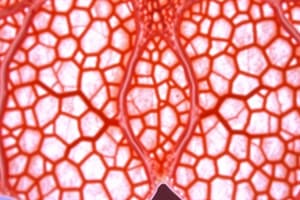Podcast
Questions and Answers
Which type of dense connective tissue primarily provides strength and consists of parallel collagen fibers?
Which type of dense connective tissue primarily provides strength and consists of parallel collagen fibers?
- Dense irregular connective tissue
- Dense regular connective tissue (correct)
- Fibrocartilage
- Elastic connective tissue
What type of cartilage is characterized by having chondrocytes in lacunae and a basophilic homogeneous matrix?
What type of cartilage is characterized by having chondrocytes in lacunae and a basophilic homogeneous matrix?
- Hyaline cartilage (correct)
- Dense irregular connective tissue
- Elastic cartilage
- Fibrocartilage
Which function is a primary role of dense irregular connective tissue?
Which function is a primary role of dense irregular connective tissue?
- Store energy in the form of lipids
- Provide tensile strength in multiple directions (correct)
- Support and protect vital organs
- Facilitate the growth of new blood vessels
Where is elastic cartilage primarily found?
Where is elastic cartilage primarily found?
What is a key characteristic of fibroblasts in dense regular connective tissue?
What is a key characteristic of fibroblasts in dense regular connective tissue?
Which type of muscle tissue is characterized by striations and is under voluntary control?
Which type of muscle tissue is characterized by striations and is under voluntary control?
What role does osseous tissue primarily serve in the body?
What role does osseous tissue primarily serve in the body?
In which location would you most likely find fibrocartilage?
In which location would you most likely find fibrocartilage?
What type of dense connective tissue contains a wavy arrangement of fibers and is located in elastic arteries?
What type of dense connective tissue contains a wavy arrangement of fibers and is located in elastic arteries?
What is the primary function of hyaline cartilage?
What is the primary function of hyaline cartilage?
Which type of connective tissue is primarily found in the embryo and gives rise to all types of connective tissue?
Which type of connective tissue is primarily found in the embryo and gives rise to all types of connective tissue?
What is the primary function of adipose connective tissue?
What is the primary function of adipose connective tissue?
Where is reticular connective tissue primarily located?
Where is reticular connective tissue primarily located?
Which of the following best describes loose connective tissue?
Which of the following best describes loose connective tissue?
What type of cells are primarily found in areolar connective tissue?
What type of cells are primarily found in areolar connective tissue?
Which connective tissue type's main function is to provide support for other cell types?
Which connective tissue type's main function is to provide support for other cell types?
What is one of the main functions of loose connective tissue?
What is one of the main functions of loose connective tissue?
Which connective tissue is composed of closely packed fat cells?
Which connective tissue is composed of closely packed fat cells?
Which fibers are included in areolar connective tissue?
Which fibers are included in areolar connective tissue?
The main role of fibroblasts in connective tissue is to:
The main role of fibroblasts in connective tissue is to:
Which type of muscle tissue is characterized by branching, striated cells that are generally uninucleate?
Which type of muscle tissue is characterized by branching, striated cells that are generally uninucleate?
What is the primary function of smooth muscle tissue?
What is the primary function of smooth muscle tissue?
Which type of muscle tissue has cells that are arranged closely to form sheets?
Which type of muscle tissue has cells that are arranged closely to form sheets?
What distinguishes cardiac muscle tissue from skeletal muscle tissue?
What distinguishes cardiac muscle tissue from skeletal muscle tissue?
Which component of nervous tissue carries signals away from the cell body?
Which component of nervous tissue carries signals away from the cell body?
Which statement about skeletal muscle fibers is correct?
Which statement about skeletal muscle fibers is correct?
What is a characteristic feature of smooth muscle tissue?
What is a characteristic feature of smooth muscle tissue?
Which location is primarily associated with the presence of cardiac muscle tissue?
Which location is primarily associated with the presence of cardiac muscle tissue?
How do the nuclei in cardiac muscle cells differ from those in smooth muscle cells?
How do the nuclei in cardiac muscle cells differ from those in smooth muscle cells?
What is the primary role of the intercalated discs found in cardiac muscle tissue?
What is the primary role of the intercalated discs found in cardiac muscle tissue?
Flashcards
Dense regular connective tissue
Dense regular connective tissue
Connective tissue with primarily parallel collagen fibers for strength, found in tendons and ligaments.
Dense irregular connective tissue
Dense irregular connective tissue
Connective tissue with irregularly arranged collagen fibers, providing structural strength in various locations.
Elastic connective tissue
Elastic connective tissue
Connective tissue with wavy elastic fibers allowing stretching and recoil, found in areas needing elasticity
Hyaline cartilage
Hyaline cartilage
Signup and view all the flashcards
Elastic cartilage
Elastic cartilage
Signup and view all the flashcards
Fibrocartilage
Fibrocartilage
Signup and view all the flashcards
Skeletal muscle
Skeletal muscle
Signup and view all the flashcards
Osteon
Osteon
Signup and view all the flashcards
Cartilage
Cartilage
Signup and view all the flashcards
Collagen fiber
Collagen fiber
Signup and view all the flashcards
Cardiac Muscle
Cardiac Muscle
Signup and view all the flashcards
Smooth Muscle
Smooth Muscle
Signup and view all the flashcards
Neuron
Neuron
Signup and view all the flashcards
Cardiac Muscle Cell Shape
Cardiac Muscle Cell Shape
Signup and view all the flashcards
Smooth Muscle Cell Shape
Smooth Muscle Cell Shape
Signup and view all the flashcards
Nervous Tissue Location
Nervous Tissue Location
Signup and view all the flashcards
Axon Function
Axon Function
Signup and view all the flashcards
Dendrite Function
Dendrite Function
Signup and view all the flashcards
Neuron Cell Body
Neuron Cell Body
Signup and view all the flashcards
Areolar Tissue
Areolar Tissue
Signup and view all the flashcards
Adipose Tissue
Adipose Tissue
Signup and view all the flashcards
Reticular Tissue
Reticular Tissue
Signup and view all the flashcards
Mesenchymal Tissue
Mesenchymal Tissue
Signup and view all the flashcards
Connective Tissue Proper
Connective Tissue Proper
Signup and view all the flashcards
Elastic Fibers
Elastic Fibers
Signup and view all the flashcards
Reticular Fibers
Reticular Fibers
Signup and view all the flashcards
Fibroblasts
Fibroblasts
Signup and view all the flashcards
Adipocytes
Adipocytes
Signup and view all the flashcards
Study Notes
Connective Tissue
- Connective tissue is derived from mesenchymal cells.
- It has a variety of subclasses, including loose and dense connective tissue, cartilage, and bone (osseous tissue).
- Loose connective tissue has three main types of fibers: collagen, elastic, and reticular.
- Areolar tissue is a type of loose connective tissue located beneath the epithelium and surrounding organs and capillaries. Its function includes strength, elasticity, and support.
- Adipose tissue is another type of loose connective tissue composed of adipocytes. Adipocytes store fat and are crucial in regulating heat loss, energy storage, and structural support.
- Reticular tissue is a loose connective tissue that supports lymphoid organs.
- Dense connective tissue is further categorized into regular, irregular, and elastic types.
- Dense regular connective tissue is packed with parallel collagen fibers, providing strength found in tendons and ligaments.
- Dense irregular connective tissue has irregularly arranged collagen fibers, providing strength to the dermis (skin) and surrounding organs.
- Elastic connective tissue has wavy bands of elastic fibers, providing elasticity and support, found in parts like the vocal cords and the walls of large arteries.
- Cartilage is a supportive connective tissue containing chondrocytes. Hyaline cartilage is a glassy matrix found at the ends of long bones, trachea, and larynx. It supports and allows smooth movement of joints.
- Elastic cartilage supports the external ear (pinna) and epiglottis; it maintains shape and assists in flexible movement.
- Fibrocartilage is a firm matrix found in pubic symphyses and intervertebral discs. It has thick bundles of collagen fibers and high tensile strength for absorbing compression.
- Osseous tissue, or bone, is a hard, calcified matrix containing osteocytes. Osteons, Haversian canals, lacunae, and canaliculi structures are characteristic of bone. Bone protects organs, supports the body, stores minerals, and enables movement.
- Bone has a calcified matrix with osteons, lacunae and canaliculi and osteocytes which provide support, protection, storage of minerals and enable movement.
Muscle Tissue
- Muscle tissue consists of skeletal, cardiac, and smooth muscle.
- Skeletal muscle is voluntary, multinucleated, and striated, providing locomotion and manipulation.
- Cardiac muscle is involuntary, branched, and striated with intercalated discs; it's found in the heart and responsible for blood circulation.
- Smooth muscle is involuntary, spindle-shaped, and non-striated; it enables involuntary movement and substance propulsion throughout the body. It is found in the walls of organs and vessels.
Nervous Tissue
- Nervous tissue is composed of neurons.
- Neurons have a cell body containing the nucleus, axons which transmit signals away from the cell body and dendrites which typically carry signals toward the cell body.
- Nervous tissue transmits electrical signals throughout the body, controlling and communicating information. It is located in the brain, spinal cord, and nerves.
Studying That Suits You
Use AI to generate personalized quizzes and flashcards to suit your learning preferences.




